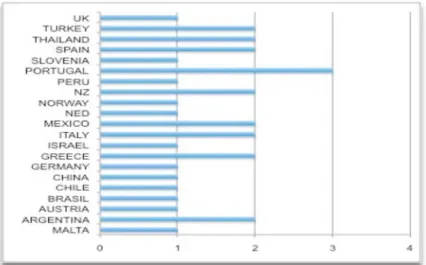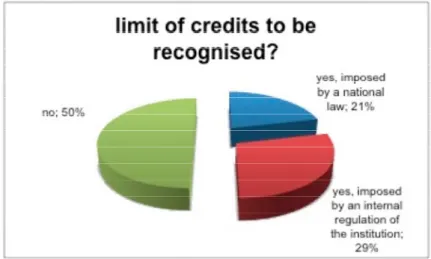Procedia Food Science 1 (2011) 1888 – 1894
2211–601X © 2011 Published by Elsevier B.V. Selection and/or peer-review under responsibility of 11th International Congress on Engineering and Food (ICEF 11) Executive Committee.
doi:10.1016/j.profoo.2011.09.277
Recognition of Prior Learning - a research under ISEKI_Food
3 project
Marco Dalla Rosa
aa
*, Rui Costa
b, Cristina Silva
ca Alma Mater Studiorum, University of Bologna, Department of Food Science, Italy b CERNAS/ Escola Superior Agrária, Instituto Politécnico de Coimbra, Coimbra, Portugal
c Universidade Católica Portuguesa, Escola Superior de Biotecnologia, Porto, Portugal
Abstract
In the frame of the ISEKI_Food 3 Erasmus Thematic Network activities, a working group related to the Life Long learning has been established. A questionnaire was created in order to know if and how the prior experiental learning (courses, working activities, language certifications, computer license, etc.) are considered and accreditated /recognised by the universities belonging the ISEKI_Food and ISEKI_Mundus partners to give academic credits to the students with prior certified experiences in order to facilitate the student’s curriculum. Among the questions, data on a maximum of credits to be recognized, disciplines more frequently submitted to recognition, type of agreement between university and other institutions (secondary schools, training agencies, etc,), prior experience / learning, were included into the questionnaire. The recognition of prior learning or experiences resulted to be mainly related to foreign language certification and working experience in non-academic environment as well as industries or analytical laboratories. Credits in informatic certification (i.e. European Computer Driving License) and demonstrated personal skills courses were also considered.
© 2011 Published by Elsevier Ltd. Selection and/or peer-review under responsibility of ICEF11
Keywords: Recognition of Prior Learning; Lifelong Learning; Euorpean Higher Education Area; ISEKI_Food3; ISEKI_Mundus2
1. Introduction
Recognition of prior learning is an essential tool to foster lifelong learning within the European Higher Education Area. Professionals will be more attracted to go back to higher education if their competences
* Corresponding author. Tel.: +39 0547 636147; fax: +39 0547 382348. E-mail address: marco.dallarosa@unibo.it
are adequately recognized as credits in the programmes they want to study and complete (Corradi et al. [1]).
In the frame of the ISEKI_Food 3 Academic Network project (www.iseki-food.eu), the activity inside a work package (WP7) is dedicated to the facilitation and promotion of Life Long Learning in higher education (Pittia et al. [2]). To perform this objective, the work package has been designed to have different activities corresponding to actions in different fields and related deliverables. Within the aims of the WP7, recognition or accreditation of learning performed in non academic environment (“prior learning”) was studied. APEL/RPL is the formal acknowledgement (based on professional assessment) of learning acquired from previous experience, usually from experience unrelated to an academic context. Accreditation here means recognition of individual experience/learning.
APEL is the accreditation of prior experiential learning, that is, the award of credit for learning based on prior experience -- from work, community or volunteer experience -- which has not previously been assessed and/or awarded credit. By converting informal learning into certificated learning, APEL provides cost-effective routes to qualifications. It has potential significance for people who, through life and work experience, have learned knowledge, skills and analytical abilities that are comparable to those in a higher education award.
The objective of this work was to collect and to evaluate the procedure of APEL /RPL in different countries / academic environments. Data have been collected from many partners, but we expect further answers to deliver the final document at the end of ISEKI_Food3 project. This should report a survey of university network partners about APEL /RPL organization and methods used. It will include the identification of the cycle where the prior learning is recognized and the methodology applied to do it.
2. Materials & Methods
Following the presentation of the aim and objective of the topic during project meeting, a questionnaire has been set-up to be filled on-line by ISEKI_Food partners. In the questionnaire the questions were placed to collect information around the consideration of prior experiences and /or learning activity, certified when possible, are recognized by University to obtain ECTS in order to facilitate the student’s curriculum. For “accreditation” here means recognition of individual experience / learning in a specified subject or areas of expertise not necessarily awarded by a duly recognized and respected accrediting organization (ISO, BS, etc.).
Maximum of credits to be recognized, disciplines more frequently subjected to this procedure of recognition, type of agreement between university and other institutions (secondary schools, training agencies, etc,), prior experience/ learning, were all items covered by the questionnaire. At the end of it, for the universities where no ECTS are usually recognized, the final question regarded the possibility / idea or prediction to apply this type of facilitation in own institutions.
3. Results & Discussion
More than thirty answers have been collected until now, but we expect to have other filled questionnaires shortly during the ISEKI_Food3 running months, since the project is going to finish in autumn 2011. Less than 50% of the partners who answered showed to have RPL system, mainly for the first and second degree level (roughly bachelor and master degrees). Most of the recognized prior learning or experiences we found were related to foreign language certification, followed very closely by the working experience, and then a few cases of credits recognized for non-academic certification or other not well defined experiences were showed. Credits in informatics and demonstration of personal skills are also considered.
Among the 31 answers, the distribution was around 60% from ISEKI_Food 3 and 40% from ISEKI_Mundus2 partners, and the numer of answer per country is reported in Figure 1.
More than 51% of the answering partners do not have any APEL/RPL system.
Among the positive answers, the APEL/RPL system is active equally for students approaching the first level-bachelor degree and masters. In Figure 2 data of number of answers for the three cycles of high education are reported. Only in few cases APEL / RPL were found to be applied for PhD.
The main types of prior certified experiences to be recognized are those related to volunteer language courses able to deliver language certification (TOEFL, FIRST, etc.) or computer license and to the working experiences. In Figure 3 data referred to those certifications are reported.
Fig. 1. Number of answer to the questionnaire on Accreditation / Recognition of Prior Learning
For the 50% of the partner having an APEL/RPL system, a limit of recognized credit number is fixed, as reported in Figure 4. In some cases it is imposed by national law issued by Ministry of Education even if in other institutions is fixed by internal regulation. The value of limited credit was found to be very different among countries, and even within the same country. In Italy for example, at Udine university there is a limit of 9 ECTS whilst at University of Bologna the limit is fixed on 30 ECTS. At Algarve University (Portugal) this value goes up to 60 ECTS and at London Metropolitan University (UK) the threshold is up to the 50% of the total ECTS.
Another question was addressed to the posibility that those recognised credits could be used to obtain the degree at bachelor or master level. Results showed that on a total of 13 answers almost half of the partner’s universities permit that recognized ECTS might be used for both the degree levels.
Fig. 3. Accreditation / Recognition of Prior Learning on the basis of type of certification
Fig. 5. Academic activities where the prior experiental learning are mainly recognised
In relation to the area of discipline or academic activities in whìch the prior learning experiences are mainly concerned, the principal area was found to be the training, where it is compulsory to complete the academic courses. Data related to those areas are given in Figure 5.
Furthermore, a big issue for discussion and comments has been the methodology how to perform the recognition of prior experiences. As well as resulted from the questionnaire answers, most of the recognitions have been performed by a special committee, followed by the presentation of a portfolio of experiences, a written examination or an examination specifically done by the teachers interested in the program proposed for recognition, following suggestions given by Arter and Spandel [3].
Percentage data of methods used to recognize prior experiences is showed in Figure 6. Other question was regarding when university accepts a student through recognition of prior learning, if the institutions design a specific study plan. Answer to this question were well discussed, too, and data showed that in most of the universities (53%) there is a specific study plan for the applicants, whilst in the 7% of cases the plan is general and not individually driven but in 40% of answers no specific plan is designed.
Another interesting point to evaluate learning experience prior to the start of the academic studies, is the possibility to have special agreements between university and secondary schools or High education activities (as well as technical school programmes) where special courses could be given by university professors. This possibility seems to be very interesting looking to the High Education Area in Europe. Nevertheless, only in around 1/3 of the answers (35%) resulted that there is an agreement between University and other Institution to recognize credits that the incoming students could ask for the accreditation, and thus the facilitation to obtain a bachelor or master degree.
This type of recognition is limited according to local / national rules, in example up to 60 ECTS in Portugal (Algarve University), 24 ECTS at Wageningen University (NED), 6 ECTS at Technical University of Cartagena (Spain), 10 ECTS in Italy (University of Bologna) and 20 credits in Mexico.
A brief explanation was asked to the ISEKI partners in order to understand how those type of agreements were carried out. Results showed that there are different ways to perform those agreements, briefly reported as follows:
•
Participation of university professors in intermediate professional courses after secondary school but before entering the unviversity•
There is a programme, but that programme is NOT recognised by ECTS, but simply an extra requirement for admission.•
University offers Foundation courses to prepare students for first year of university study.•
There is a common course on basic mathematics, physics, chemistry, biology, history of sciences and scientific methodology.Finally, to the partner who do not still have APEL/RPL system, it was asked if in the future they forecast an application of it. Around 1/3 of the partners do not having APEL/RPL answered negatively, that it is not possible that in the future their institution could apply that system, whilst 56% answered positively, 5% in doubt and 6% did not give any answers.
4. Conclusions
Many of the partners participating in the survey and/or attending to the meeting where the APEL methodology were explained and the questionnaire presented showed to be interested to report their own experience, which result to be very differentiated from country to country. Partners that did not still have implemented an APEL system mostly confirmed their interest in the procedure, and some of them declared that they will try to establish such a system in their own institution.
Acknowledgements
Research carried out with the support of LLP Academic Network: 142822-LLP-1-1-PT-ERASMUS-ENW – contract n. 3833/001-001, and of Erasmus Mundus Thematic Network: 2008-2442 / 002-001 MUN MUNATT of European Union.
References
[1] Pittia P., Dalla Rosa M. & Mannino S.. I progetti ISEKI e la rete ISEKI_Food. Industrie Alimentari; 2010; XLIX (9): 19-24. [2] Corradi C., Evans N. & Valk A.. Recognising Experiental Learing: Practices in European Universities. European University Lifelong Learning Network (EULLearN), Tartu University Press (Estonia); 2006.
[3] Arter J. & Spandel V. Using portfolio of student work in instruction and assessment. Educational Measurement: Issues and Practice; 1992; 11: 36-44.


